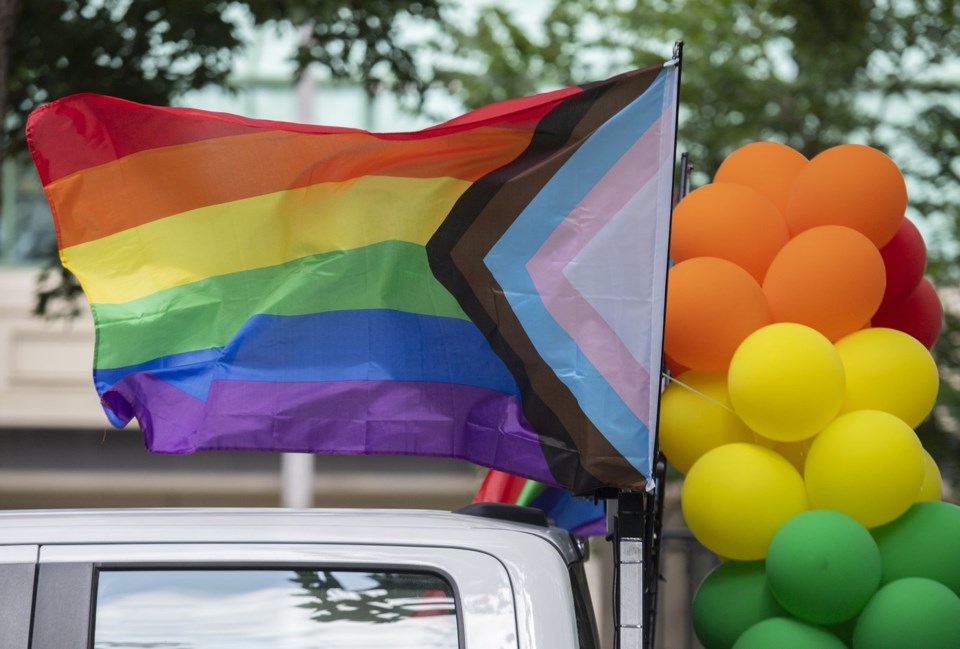MONTREAL — A new survey of thousands of Quebec high school students shows that anti-LGBTQ+ attitudes have risen sharply, with more than 40 per cent of respondents saying they would feel uncomfortable to learn their best friend was gay.
On Thursday, GRIS-Montréal, an LGBTQ+ advocacy group, released findings from 35,705 questionnaires it distributed to students in Montreal, Quebec City, and other regions of the province.
The number of respondents who said they would be uncomfortable to learn their best friend is a lesbian doubled to 33.8 per cent in the 2023-24 school year from 15.2 per cent in the 2017-18 academic year. Meanwhile, 40.4 per cent said they would be uncomfortable to learn their best friend is gay, up from 24.7 per cent over the same period.
“I thought young people today were more open, more inclusive, more accepting than when I was in high school myself. Let's just say my bubble burst a little bit,” said Mélanie Laviolette, president of a federation of Quebec parent committees, who joined members of GRIS-Montréal at a news conference Thursday.
Marie Houzeau, general manager of GRIS-Montréal, said that since the group began collecting data in 1994 the level of acceptance had grown year by year, but she said that trend began to reverse in the 2018-19 academic year.
When asked how they felt about two men in a relationship raising children, 24.4 per cent of respondents said they were uncomfortable, more than double the 10.4 per cent who said that in the 2017-18 school year.
Intolerant attitudes toward LGBTQ+ people rose across the board — expressed by youth of all age, gender, faith and geographic locations.
“However, we have noticed that the regression is more significant and faster among young boys than young girls and more significant for those who don’t know sexually and gender diverse people in their circles,” Houzeau said in an interview Thursday.
The rise in anti-LGBTQ+ sentiment was particularly sharp in the 2021-22 school year, with some students including comments in the survey such as “stop normalizing a shameful thing” and “it’s my right to be homophobic.”
As for what is causing the reversal among teenagers in the province, Houzeau pointed to homophobic and transphobic discourses by politicians, columnists and social media influencers in Quebec and Canada, without being specific.
“We see that masculinist discourse is increasingly present … and we also see it in our questionnaires with kids saying, for example, ‘if you want to know what I think about homosexuality ask Andrew Tate,’” she said, referring to the online influencer accused in Romania of rape, human trafficking, and forming a criminal gang to sexually exploit women. He has denied those accusations.
Line Chamberland, retired professor and research chair on gender and sexual diversity at Université du Quebec à Montréal, said right-wing political discourse on social media platforms about what is considered “normal” and “unacceptable” in romantic relationships and parenthood has influenced young people’s views.
Those who identify as transgender are most under attack, Chamberland stressed, adding that values of acceptance must be upheld outside the classroom for Quebec to truly overcome intolerance.
While Laviolette called on parents to intervene at home when their children make inappropriate comments, Houzeau asked that people in positions of authority, whether in government or in schools, advocate for inclusion.
“As a society, Quebec has been a leader for decades in inclusion and openness to sexual diversity. Now it’s time to take the microphone again to reaffirm these values at every level,” Houzeau said.
This report by The Canadian Press was first published Jan. 16, 2025.
— With files from Katrine Desautels and The Associated Press
Canadian Press health coverage receives support through a partnership with the Canadian Medical Association. CP is solely responsible for this content.
Joe Bongiorno, The Canadian Press



